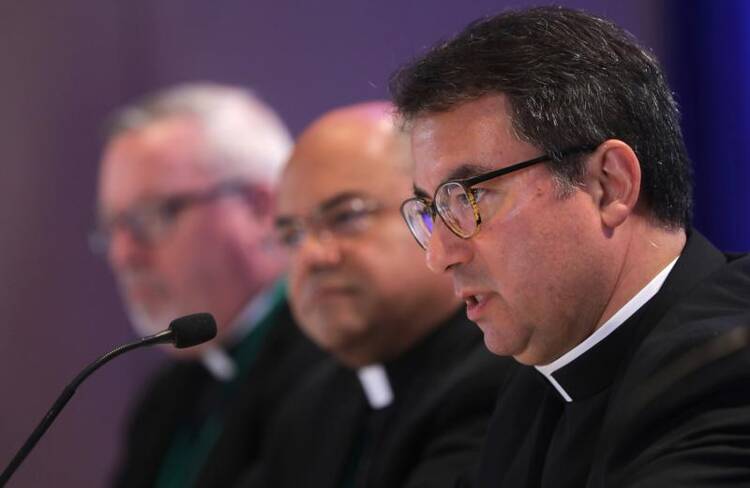WASHINGTON (CNS) -- Bishop Oscar Cantu, coadjutor bishop of San Jose, California, has assumed pastoral governance of the diocese with the resignation of Bishop Patrick J. McGrath.
Bishop Cantu, 52, had been coadjutor bishop since July. Bishop McGrath, 73, had led the Diocese of San Jose since 1999.
The appointment was announced May 1 in Washington by Archbishop Christophe Pierre, apostolic nuncio to the United States.
Bishop Cantu previously headed the Diocese of Las Cruces, New Mexico. He is the former chairman of the U.S. Conference of Catholic Bishops' Committee on International Justice and Peace. He currently is a member of the USCCB Subcommittee on the Church in Latin America and the Subcommittee on Hispanic Affairs.
He was one of two delegates chosen by the bishops to represent the USCCB during Pope Francis' visit to Mexico in 2016.
Before he was named to head the Las Cruces Diocese, he was an auxiliary bishop of San Antonio for five years.
He was born in Houston Dec. 5, 1966, the son of Ramiro and Maria de Jesus Cantu, natives of small towns near Monterrey, Mexico. He is the fifth of eight children -- five boys and three girls.
He attended Holy Name Catholic School and St. Thomas High School in Houston, and he earned a bachelor of arts degree from the University of Dallas in 1989. He has master's degrees in divinity and in theological studies (1994) from the University of St. Thomas in Houston. He was ordained a priest May 21,1994, for what is now the Archdiocese of Galveston-Houston.
In 2000, he earned his licentiate of sacred theology from the Pontifical Gregorian University in Rome; he also has a doctorate of sacred theology in dogmatic theology from the Gregorian.
He spent his priestly career working in parishes throughout the Houston metropolitan area. His first assignment was as parochial vicar at St. Christopher Parish. He also taught at the University of St. Thomas and at St. Mary's Seminary. He served as pastor at Holy Name Parish.
He was involved in the Christian Family movement; conducted retreats and worked with the Engaged Encounter ministry. Bishop Cantu also was also involved in The Metropolitan Organization, or TMO, which addresses social issues in the community.
A coadjutor automatically becomes the head of the diocese upon the death or retirement of its bishop.
Bishop McGrath, a native of Ireland, was an auxiliary bishop of San Francisco from 1989 until 1998, when he was named coadjutor of San Jose. He became the head of the diocese after Bishop R. Pierre DuMaine retired. Bishop DuMaine was the first bishop of the San Jose Diocese, which was created in 1981.
The 1,300-square-mile diocese has a total population of just over 1.9 million people, of whom 620,000, or about 32.3 percent, are Catholic.










